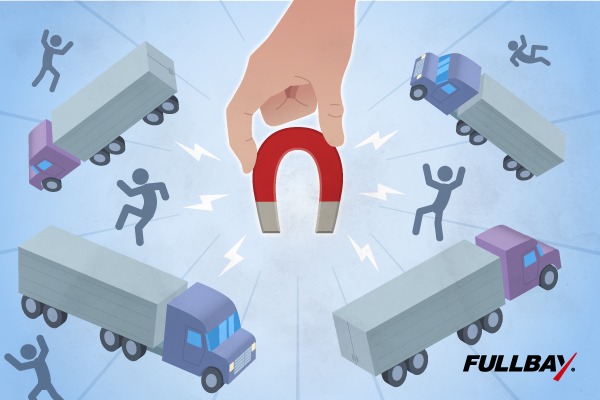The S-Word: Building a Sales Component for Your Shop

Sales.
Did a shiver run down your spine when we said that word? Are you picturing cold calls and awkward phone conversations, or worse yet, dull PowerPoint presentations that don’t even include lunch?
We understand. Sales can be scary, or any number of other adjectives.

But sales are a necessity for any business. You need to drive them, or your shop won’t survive. Building a sales component, if not an outright sales team, into your operations can help you drum up more business. It can even be a continuation of your regular marketing plan.
We wanted to give our readers some tips regarding how they can make a sales team work for them, and so we sat down with Stacy Conner, co-owner of Equipment Experts, Inc. We’d spoken to Stacy before for a case study we did on EE, and were so fascinated by how the shop handled the dreaded S-Word that we asked her to chat with us more about the topic.
We’ve paired Stacy’s experiences with our own advice. We don’t think we need to point out that your mileage will vary. If some of these tips and tricks work for you, great. If not, get out there and find something that does.
The bottom line is that any successful shop needs to drive sales somehow, whether you’ve got one person doing it or the entire crew is pitching in.
Here are a few ideas to get you started.
BUT WHY DO WE NEED SALES?
Fullbay, you might be saying, I have customers coming out of my ears. Why do I need a sales team?
Let’s clarify something before we go any further: not every shop has the financial bandwidth or need for an actual full sales team of dudes in suits. Equipment Experts has one full-time guy on staff. So you don’t need to clean out an office and hire a bunch of people to start a sales department.
In some cases, the sales department is probably you.
As for why you need sales, well, you need to make money, don’t you? Just because things are looking rosy for you now doesn’t mean they will always look that way. Everyone runs into slow periods. The economy goes up and down. Things happen. A sales component is a safeguard against some of that.
But Fullbay, you might be saying, isn’t that what marketing is for?
So, we’ve written at length about marketing. We even wrote a book about it. We look at marketing and sales as two parts of a whole; marketing is the beginning – getting the word out and generating leads – whereas sales is about closing the deal. A competent salesperson and/or crew can be all the difference between someone hearing about your shop and going “Oh, cool” and someone hearing about your shop and going, “Actually, let me book an appointment.”
Okay. With that out of the way, let’s talk a bit about what you absolutely need in a salesperson.
THE KEYS TO ANY SALES TEAM
Whether you’re handling sales on your own or have someone manning the phone lines for you, it all comes down to one question: What will generate revenue for you while making customers happy?
If you paused when you landed on customer happiness – and are wondering how that topic wound up in a sales blog – let us put your mind at ease. We know sales tends to get a bad rap. Part of that is because some folks do forget that the customers are the bottom line. It’s easy to get wrapped up in how many calls you need to make, or how much income you need to generate. But if you aren’t keeping customers happy – if you aren’t building everything you do around them – they aren’t going to come back.
So. How do you keep them happy while generating revenue? How do you convince them that you want to do right by them?
1. Trust.
If a customer trusts that you’ll do right by them, they won’t have any qualms turning over their vehicles to you. They’ll listen to your recommendations because they know that even when you upsell them, you aren’t pushing things they don’t need.
A customer’s trust is priceless. These are the people who will recommend you to their friends and family. They’ll bring their trucks and equipment back season after season, year after year.
Trust is the absolute lynchpin that Equipment Experts has built its reputation around. Stacy compares building trust with a customer with dating. Yes, dating.
What is dating, at its core? It’s getting to know someone and learning to trust them. You go out for coffee, you go out for dinner, you meet their family. So when you talk to customers or potential customers, don’t look at them as just potential sales. These are people that you can learn about and forge a connection with.
Stacy’s team also takes the dreaded concept of upselling and turns it into a good thing – namely, they don’t do it unless it’s necessary.
“Something that is recommended to a customer that they don’t need is not acceptable in our culture,” she says.
If techs notice something that will become a safety issue later on, they’ll note it to the customer, saying, “You might want to take care of this now.” But if a truck is in otherwise great shape, they will not recommend something that isn’t necessary.
Customers know this. They respect EE more for this. They trust EE – and as a result they’re inclined to authorize the work their techs suggest.
2. Go the extra mile.
Trust needs to be part of your workplace culture. A willingness to do what’s necessary to help your customers out goes a long way in building that trust. Remember: These are people just like you. Yes, your primary function in their life is to repair and maintain their vehicles and equipment, but that can take on many different forms.
Stacy recalls getting a call from one of EE’s customers, who was stranded 60 miles away. Usually she would have sent one of her mobile techs out to rescue him, but there was a catch…a blizzard was raging outside.
The roads were awful; if he were close by, it might have been OK, but she couldn’t risk sending a tech 60 miles in that mess. Still, she had to do something. She called around and eventually located a repair shop just a mile from the stranded driver. She paid that shop to head to the driver and get him back on the road. Once he was safely underway again, he paid Equipment Experts for the cost of the repair.
Pretty impressive, huh? That customer is going to trust Stacy and Equipment Experts for as long as he’s out on the road.
Now, not every customer is going to need you to brave horrifying road conditions to get to them. But the core of your business should be built around how you can help your customers. Most of the time, that’ll be a much-needed repair or PM work.
But sometimes you’ll need to work a little harder for them. You’ll remember that they’re people, just like you, and sometimes people need a hand. If you can’t go out to save them in a blizzard, you might be able to find someone who can.
That’s going the extra mile.
That’s how you build trust.
SALES TACTICS
That’s great, Fullbay, you’re probably saying, but what can I do when I’m not saving my customers from blizzards?
Here’s the unfortunate truth: If you have to ask us how to drum up sales or do a little marketing, it’s a good bet you’re already…well…doing it wrong.
Okay, we’ll revise that. You’re probably not doing anything at all.
“So many shops don’t do anything,” Stacy remarks. “They don’t have a plan for marketing.”
We can’t provide a point-by-point marketing/sales plan for you (although once again, we point you toward our marketing book). What we can do is break down some of the mystique around sales, and recommend some things to keep in mind when working on your own sales blueprint.
1. Cold calling.
You probably winced as soon as you saw that subheader. But cold calling doesn’t need to be a long, awkward conversation. Think of it as introducing yourself to someone who might need your services. Stacy recommends a simple pitch: “This is what we do. This is a service that you need.”
Worst comes to worst, they say no thanks and you move on. But what if they do need a repair shop’s help right now? What if they keep your name at the back of their mind? They might call you a week later, a month later, even a year later.
Congratulations. That person is what we call a lead.
If the idea of cold calling still makes your knees knock, this is a place where even a part-time salesperson can be a big help. They’ll be the ones making the calls – you can stick to running your shop. For a time, Equipment Experts’ sales specialist was making 80-90 cold calls a day – that was pretty much his entire job. Did he land every potential customer? Of course not. But if he even lands one customer a day…multiply that by five days a week…and then multiply that (stay with us) by 52 weeks in a year.
That’s 260 new customers calling your shop.
Those are some impressive numbers, even for this math-challenged writer.
2. Keeping in touch.
Talk to your customers. Remind them that you exist. When it comes to current and prior customers, you likely have addresses and emails for them. Send out brochures or special programs you may be rolling out. Put together a monthly newsletter that you email to your current clients, talking about changes in the shop and industry, or specials you’re running.
Do you have slow periods? Of course you do; every shop runs into them. Figure out when yours are and build special programs that you’ll roll out when those slow spots happen. What these programs entail is up to you; they’re designed to entice customers (old or new) into a visit.
Equipment Experts has even commissioned videos that utilize photographs of their own repair crew along with brief messaging that talks about their shop and why you should use them. The videos run on YouTube, but Stacy has also used them in presentations and put them on a loop during conventions.
Keeping in touch is one of the most basic things you can do to remind your customers that you exist. Communicating with your customers – even through free, seemingly basic social media platforms – keeps your shop’s name floating about in their minds.
3. Promote your tools.
If you had a wildly inventive and/or effective new method of accomplishing a task, you’d want to mention that to your customers, right? You want customers to know the excellent work you do, and if you have software or some other tool that helps you in that regard, well, that’s just an extra selling point.
If you’ll let us toot our own horn for a bit, let’s take Fullbay itself as an example. The customer portal and tracking abilities are popular with our customers. Fullbay lets them run a more efficient and productive shop, and they can pass that efficiency and excellent work onto their customers. Equipment Experts has demonstrated some of Fullbay’s features to potential customers in a “Look at what we can do” context. So far, it’s worked.
In an effort to not sound like complete egomaniacs, we’ll suggest that you promote any tools that will help you go above and beyond other shops. This can also extend to techs that have highly specialized certifications, or particular experience that’s hard to find in this area.
If you’ve got something cool in your arsenal, do a bit of bragging. We promise, we don’t mind.
WHAT DO I NEED IN A SALES PARTNER?
So, you’ve acknowledged that you need some help in the sales area and you’re ready to stick a toe into the hiring waters. Great! We can help a little bit. The following advice applies whether you’re hiring someone just for sales or you’re looking to broaden your own efforts:
Go for attitude over experience.
You don’t need a highly skilled salesman to help you make sales. You need someone who wants to help your customers. Maybe you find some kid fresh out of school who knows zero about the industry or even sales – but they’re a good person and you like them as a human being. You don’t need to pass them up for the battle-hardened sales guy who’s been doing this for twenty years.
If the untried kid is willing to learn and wants to help your customers and get the job done, that’s going to make all the difference. They might not get everything right straight out of the gate, but guess what? No one does. Making mistakes and yes, even failing, is how we learn.
That might seem strange, considering how much our society has ostracized failure. This article isn’t the time or place to go into that, but you can probably remember how mortifying it was to fail a test or a class. And yet failure is what teaches us the most. It’s how we learn what not to do, as well as what to do instead.
Stacy shared a favorite quote with us regarding learning and making mistakes:
“Good judgment comes from experience. Where does experience come from? Bad judgment.”
As long as you and your sales team – whoever they are – remember that, you’ll be on the right track.
HOW CAN I BE BETTER AT SALES?
Have you decided to take a crack at sales yourself? Good for you! Stacy had a word of advice for anyone who wants to improve at sales – but we think this advice can apply to anything: “Remove invisible barriers.”
Humans are quite good at setting themselves up for failure. The things you put in front of yourself are going to hold you back. Stacy shared a few examples of these thoughts: “I don’t want to be too successful; the tax man will find me” “Corporations are evil, profit is bad, sales is an awful industry.” “I hate the phone.”
If you repeat these things to yourself often enough, you’re going to believe them, and then you won’t even make the effort. You’ll talk yourself out of it before you even get started.
If you let those things go, however, and make a hundred calls a day – well, just start doing the math. Maybe you only land ten customers a day. Maybe you only add one customer a day. One out of a hundred isn’t a great number, but one a day over the course of a year is genuine business.
As you push those invisible barriers out of the way, accept that you’ll make mistakes and you’ll be learning as you go.
Stacy warns against trying to operate in a silo. You aren’t in a vacuum, and you shouldn’t try to be. Attend networking events and conferences. Talk to people who have done what you’re trying to do and get their advice. You’d be surprised by how many of them are perfectly willing to share their knowledge with you. Don’t look at them as competition, even if they are; at their core, they’re just people like you, trying to do good work and feed their families.
Be willing to learn, willing to try, and willing to fail.
SALES AREN’T EVIL
Wow. We covered quite a lot in this piece, didn’t we?
You probably don’t feel like a sales whiz yet. Maybe we’ve even convinced you to hire someone else to handle the job. That’s all right. A good salesperson – again, whether that’s you or someone who works in sales for a living – is an incredible asset to even the smallest shop. Having someone aboard whose entire existence revolves around selling the shop’s services and landing more customers is a shot in the arm for anyone.
Just remember that it always comes down to the customer, and the trust you’re building or have built with them. That’s the best sale of all.

